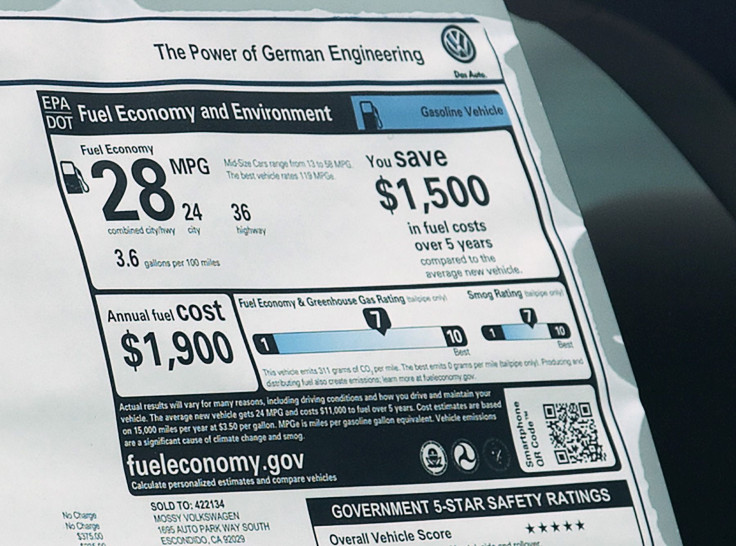Volkswagen Diesel Scandal Expands: What Should Jetta, Passat, Golf, Beetle And Audi Owners Do?

In the wake of revelations that Volkswagen deceived regulators and car buyers about the high level of polluting emissions from its diesel-powered vehicles, you have two options if you own one of these cars: Park it or pollute.
For now, that’s the message to U.S. owners of 482,000 Volkswagen Group diesel cars that spew up to 40 times the legal limit of nitrogen oxides, greenhouse gases that contribute to the severe public health threat of urban ozone pollution. Outside of this, the cars themselves pose no safety threat, and the company says it is working on a solution that will bring the vehicles’ emissions levels into compliance with state and federal law.
“Volkswagen is working at full speed to clarify irregularities concerning a particular software used in diesel engines,” Volkswagen spokesman John Shilling said by email on Tuesday. “I do not have specific timing for these measures right now.”
Volkswagen’s process is unlikely to follow traditional automotive recall procedures that are familiar to most Americans. Car and truck recalls often occur after auto-safety regulators pressure an automaker to fix dangerous parts as soon as possible. In Volkswagen’s case, owners of the company’s safe-but-dirty cars will have to wait. The company must first deliver to state and federal regulators a software patch that removes programming code created to deceive emissions testing equipment.

“They will not go ahead with the recall until Volkswagen and the EPA agree on the fix,” said Anup Bandivadekar, a program director at the International Council on Clean Transportation, the group that first identified the problem. “For owners, they’re probably feeling bad realizing their vehicles have been emitting these pollutants all along, but otherwise the cars are safe to drive.”
Volkswagen Group, which owns a raft of vehicle brands including Audi and Porsche, is facing intense scrutiny from the U.S. Environmental Protection Agency (EPA), federal prosecutors and California regulators for gaming emissions testing procedures and leading car owners to believe they were driving cars that provided fuel economy similar to that of a hybrid car. As many as 11 million cars worldwide have the problem, and Volkswagen has suspended the sale of all its diesel cars with 2-liter engines in the U.S. and Canada.
The motives for installing the hack into the cars is unclear, but it’s possible that the cars might perform differently, said Bandivadekar.
“Once the problem is fixed, it is possible that fuel economy and performance, such as acceleration time, will be affected,” he said. “But it’s not easy to make a categorical statement about it because we do not know right now exactly how Volkswagen has been calibrating the engines.”
The German auto group has set aside $7.23 billion (6.5 billion euros) to “cover the necessary service measures and other efforts to win back the trust of our customers,” Shilling said. Separately, the EPA has slapped the company with a massive $18 billion fine. In 2014, Volkswagen Group earned $12.1 billion on $225.51 billion in revenue.
Volkswagen Group stock fell 14.80 percent to 114.59 euros ($127.52) on Tuesday. The company’s shares have plummeted nearly 30 percent since Monday, the first trading day after the Wall Street Journal reported the company’s deception over the weekend.
“Determinations regarding potential penalties and other remedies will be assessed as part of the investigation EPA has opened in conjunction with the U.S. Department of Justice,” EPA spokeswoman Liz Purchia said in a statement.
The move has angered Volkswagen vehicle owners, many of whom gravitated to the company’s clean-diesel marketing pitch. Volkswagen’s diesel cars enticed eco-conscious buyers with performance and fuel-economy statistics -- numbers that are now problematic.
“I settled on the Volkswagen because it was fun and sporty to drive, and the Prius was doggy and slow and wasn’t very powerful,” a 2013 Volkswagen Jetta diesel owner told Automotive News when asked why he chose the Jetta over Toyota’s wimpy but fuel-sipping hybrid sedan.
Now owners of 2009-2015 model years Jettas, Beetles, Golfs and Audi A3s (as well as the 2014-15 Passat) will have to wait for Volkswagen to announce a formal recall of the vehicles.
© Copyright IBTimes 2024. All rights reserved.






















